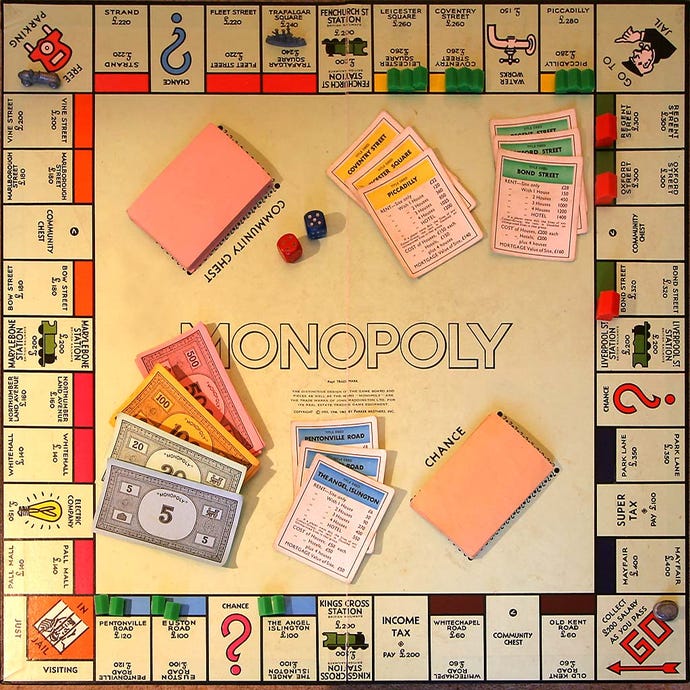Inside Monopoly's Secret War Against the Third Reich
"Ask and it shall be given you; seek and ye shall find." Eurogamer's Christian Donlan investigates.
This article first appeared on USgamer, a partner publication of VG247. Some content, such as this article, has been migrated to VG247 for posterity after USgamer's closure - but it has not been edited or further vetted by the VG247 team.
On 29th April 1913, Christopher Clayton Hutton, who earned his pay manufacturing boxes, wrote a letter to Harry Houdini, who earned his own by getting out of them.
Clayton Hutton was 20 at the time, a self-confident, ingenious, and perhaps rather eccentric young man working at his uncle's lumber yard in Saltley in the UK's West Midlands. He loved games and showmanship and magic, but he was also somewhat skeptical by nature -- possessed of an engineering mentality that sought to understand how things worked and to separate the possible from the impossible. He'd seen Houdini perform an escape act in Birmingham several years previously, and he was struck that the packing crate the magician triumphantly broke free of at the climax of the evening had been in his possession for two whole days before the show. Clayton Hutton's letter was a challenge. Would Houdini attempt an escape from one of the lumber yard's packing crates the next time he was in town -- a crate that would be constructed live on stage, by Clayton Hutton's colleagues, in the middle of the performance?
Houdini received this sort of letter every day, but Clayton Hutton's was different. Clayton Hutton was different. By accepting his challenge -- by promising Clayton Hutton the considerable sum of £100 if the packing case in question defeated him -- Houdini set in motion a strange chain of events that would, in a wonderfully mad and circuitous manner, impact the course of a vast global conflict that was at the time still 26 years away.
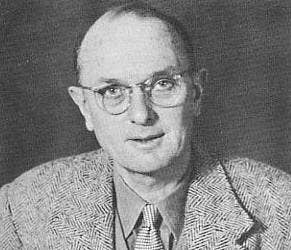
And Houdini did accept the challenge -- but with one condition. He would visit the lumber yard before the show to meet the carpenter charged with the case's construction. Clayton Hutton was still an innocent, but he was hardly an idiot, and as the magician emerged from his hansom cab outside the facilities, wearing a fur-lined coat and gaudy carpet slippers, the 20-year-old dimly suspected some kind of mischief.
He was right to: the following morning revealed that Houdini, with one eye on the cash, had come back at night to paste a showbill advertising the big event on a wall outside the factory. This was the beginning rather than the end of his wiliness, however. He had also bribed Clayton Hutton's carpenter £3 to fit the crate's nails in such a way that a crucial panel could be popped out from the inside with little in the way of a struggle.
Voila! The crate was flawed, Houdini emerged victorious, and Clayton Hutton lost out on £100. All the same, he had learned a lesson that would prove far more valuable to him over time. He had learned that, when it comes to escape, every trick counts. Eventually he would put this knowledge -- along with a very strange ally indeed -- to work for him in the Second World War.
The 51st
My maternal grandfather met this ally in a fortress in Poland several decades later. When World War 2 began, Stanley Reginald Solly from Canterbury, Kent, enlisted relatively early, joining the 51st Highlanders as a gunner in the Royal Artillery. He was 21 years old, and his combat experience was limited to riding his push-bike through the rougher parts of south-east England - parts that, in the 1930s as now, were not particularly rough at all.
His military service proved brief and bewildering. The 51st were forced to surrender to the Germans shortly after landing at St Valery in Northern France in June of 1940. My grandfather never fired a shot. He always told us his war had lasted an hour and five years. St Valery was the hour. The five years were to come.
After a lengthy forced march, which managed, miraculously, to be even worse than it sounds, the lower ranks of the 51st eventually found themselves in Stalag XXB, a huge POW camp -- in fact a series of camps -- situated near Malbork in Poland. This is where my grandfather sat out the war, in the company of a few friends, some jars of peanut butter an American charity had sent them in error -- the Brits had never seen this exotic paste before, and assumed that it was shoe polish -- and something altogether more thrilling.
A Monopoly set! A wartime edition, which meant the counters would be made from little pieces of cardboard clipped into holders, while the dice would have been replaced with a number spinner. Still, Monopoly! With its familiar streets, its familiar rituals.
Clayton Hutton was the 'joker in the pack'. He needed to be, since he had no previous plans to work to, and no official records to read. Where would he have gotten them from? Nobody had ever thought of using POWs as an asset before.
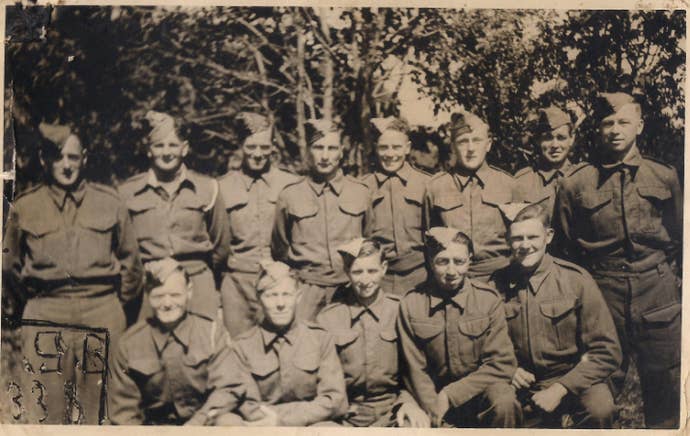
That set gave my grandfather his war stories. Spared the dangers of actual combat, he worked at a nearby farm handling the bookkeeping during the week, and he built up a dazzling property portfolio and crushed his competitors in his spare time. Long days in the camp meant that the prisoners quickly adapted the rules of the game so that a single match could take a fortnight to unfold and then they played and played and played. Europe burned, Russia was driven back into the black mud of the Eastern Front, the Blitz rained fire from the sky over St Pauls (and as far north as Glasgow). As for my grandfather? My grandfather learned the value of nabbing all the oranges quickly, so as to capitalize on any unfortunates rolling to get out of jail. He passed Go. He collected £200.
All the while he had absolutely no idea that the keys to his freedom -- keys laid by Clayton Hutton and in some crucial way inspired by that bet with the world's greatest magician -- may have been well within his reach the whole time.
A transatlantic birth
Cinematic acts of heroism were thin on the ground at Stalag XXB. Nobody dug a tunnel as far as I can tell. Nobody hopped over fences on a stolen motorbike. When I was very young, I once asked my grandfather what he remembered the most about the Second World War, and he told me of a sweltering afternoon in mid-summer during which he saw a fellow comrade valiantly defeat all opponents with nothing but Old Kent Road and Whitechapel. A victory with the cheapest cards in the deck! I was fiercely disappointed.
"That's virtually impossible!" Phil Orbanes almost yells at me when I tell him the story over Skype. There's a pause and then this veteran of Parker Brothers and chief judge of the Monopoly World Championships -- he's also the author of the book Monopoly: The World's Most Famous Game -- starts to think about it. Old Kent Road and Whitechapel. "If there were a lot of players, maybe no other groups were formed except for the light browns, and maybe if he had a couple of railroads as well?" He ponders. "Maybe you could then possibly just whittle down every one of your opponents until they've run out of cash. Okay! It's just possible."
Orbanes was destined to love Monopoly. He grew up in New Jersey a mere seven miles from Atlantic City, the faded gambling town from which the original American set borrows its real estate. The game board was practically his own neighborhood; he could have visited its houses and hotels in real life. He was also just down the road from an old POW camp where German prisoners had been interred during the Second World War. Even repurposed as a chemical plant for controlling the local mosquito population, the structure made quite an impression on an imaginative child.

"I can remember seeing that place almost every day," he tells me when our chat turns to the fate of POWs. "Boy, it was an eerie sight. To be going down the highway and see a lonely road going across a field, going past a big gate with wire and guard towers at the corner and a big huge metal tower in the centre where search lights would have been placed?" I wait, but there's nothing more. Through the cold crackle of Skype I can almost hear him shiver.
The game that Orbanes has devoted his life to -- his latest book, Monopoly, Money and You even explores the various financial lessons he's learned over his many decades of play -- had experienced a brisk few years of success by the time my grandfather encountered it in Poland. Widely attributed to a Philadelphia man named Charles Darrow in the 1930s, the roots of Monopoly actually began in 1903 with The Landlord's Game, which Elizabeth Magie created as an educational tool to explain single tax theory. You had to make your own fun back then.
Over the next few decades Magie's design was copied and bootlegged and expanded and embellished until the modern version, pitched around by Darrow, was published by Parker Bros in 1935. A transatlantic phone call lasting three minutes and costing $75 saw Monopoly landing in England a year later. It was licensed to Waddingtons, a playbill printing company that had survived a period of mismanagement and near bankruptcy to emerge, under the stewardship of Victor Watson Sr, as a quality producer of playing cards, silk theatre programs, and even cardboard jigsaw puzzles.
Monopoly was an immediate hit in the UK, and astute handling by Waddingtons saw it conquering the rest of Europe far quicker than the Nazis could ever hope to. It even overcame a brief Fascist backlash in Italy. (Mussolini was offended in part by the capitalist message, but mainly by the fact that the board game was patently not made by heroic Italians with big hands and broad shoulders, and was therefore intrinsically inglorious and depraved.)
"By the late 1930s, by the start of the war, Monopoly was huge," Orbanes explains. "And that's because Watson took the effort to go to London and very carefully develop a street plan for the UK version, and the rest of Europe took his lead." He laughs. "Monopoly's an American game, but the popularity of Monopoly outside of North America is entirely due to a British company. The only credit that Parker can take is that they had the wisdom in 1935 to create a partnership between Waddingtons and Parker US instead of perpetuating the small and rather ineffective London operation that Parker had for decades. That made the game. Even though it may have originated in the US, it's equally US and British in terms of its parents."
"This officer is eccentric..."
At around the time that Monopoly was starting to make a name for itself -- and to achieve the kind of fame that would make it such a central part of prison life in Stalag XXB -- Clayton Hutton was beginning to worry about the fate of Europe. As the 1930s drew to a close, a war was clearly looming, and he wanted to get involved.
Despite service as a pilot during the First World War, Clayton Hutton was not a career military man. Instead, he had left the service to work in journalism here and there and as a publicity director for the movie business. He had also become increasingly eccentric -- a fact that, along with his age, may explain why he was swiftly turned down when in 1939 he applied to join the Royal Air Force.
Luckily, British military intelligence was currently looking for "a showman with an interest in escapology" -- the kind of man, perhaps, who had once been publicly humiliated by the greatest magician that ever lived.
These were busy times for the intelligence services. MI9 had been newly formed under Brigadier Norman Crockatt; its objective was to facilitate the escape of any allied soldiers captured by the enemy during the coming war, and return them safely to the UK. This sort of thing required some pretty unusual thinking - and some pretty unusual thinkers. Following a short interview with Crockatt -- in which the story of the Houdini challenge played a crucial role -- Clayton Hutton was employed by MI9 as a technical officer.
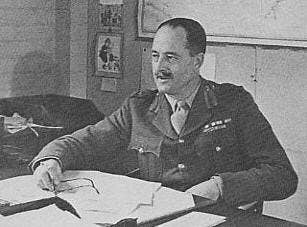
Working out of a temporary HQ set up in room 424 of the Metropole Hotel, Northumberland Avenue, Clayton Hutton had joined one of the strangest branches of military intelligence. While other departments swooped on Cambridge dons and sinister hardnuts to run their spy-rings and gather their intel, MI9 was just as likely to employ stage magicians like Jasper Maskelyne, who would eventually go on to head up the Camouflage Experimental Section (largely unsuccessfully, by the sounds of it) at Abbassia in Cairo. Rather than photographing the contents of enemy safes and running interference on rival agents, it spent its time fiddling around with designs for pocket radios and making boiled sweets for downed fighter pilots to eat as they hid in bushes. Theatricality and general trickery ruled. Any image gallery of its notables would include at least a few men who like to be photographed with an eyebrow inscrutably arched and hands outstretched, fingers splayed, as if casting a fireball.
The best book I've read on the outfit -- MI9: Escape and Evasion, by M.R.D. Foot and J. M. Langley -- comes off, at times, like a James Bond novel from the people behind LittleBigPlanet; espionage by way of Etsy. MI9's world was frequently a thrifty wonderland of the improbable and the hand-made. In tune with the strange circumstances, Clayton Hutton -- the Q figure -- was given a suitably bizarre briefing. He was presented with a uniform he was told not to wear and an office he was told to stay away from. He was also informed that the only real guidance for his job would be found in the Boy's Own memoirs written by successful escapees from previous wars -- but that most of their advice would be "no good at all."
Even for such an odd bunch, Clayton Hutton was the "joker in the pack", according to Foot and Langley. He needed to be, since he had no previous plans to work to, and no official records to read. Where would he have gotten them from? Nobody had ever thought of using POWs as an asset before. "In the last show, with a few notable exceptions, the men who were captured by the enemy were content to stay put until the cessation of hostilities," explained Crockatt in an early briefing. "This present war is to be conducted across vastly different lines. Not only will prisoners be expected to seize all opportunities of escaping; the intention is also that they are to be supplied with gadgets that will enable them to break out of the POW camps, and once out, help them to find their way to freedom."
This sounds insane, of course. As the world burned, Britain was devoting serious time and ingenuity to keeping have-a-go-heroes stocked with gizmos and trinkets churned out by a plucky bunch of garden shed types. It all makes a little more sense, though, when you take into account the sheer scale and complexity of the war that was being fought -- and the number of soldiers who were being captured every day. Nutty as this statistic initially appears, in their gloriously angry history of European POWs, The Last Escape, John Nichol and Tony Rennell suggest that, by 1944, there could have been as many as nine million prisoners of various nationalities spread across axis territory. Nine million. By the end of the war, Germany was essentially a vast, unevenly distributed prison camp -- a nation of wardens and cells and far, far worse.
Undaunted, Clayton Hutton leapt into action in headstrong fashion, procuring every monograph written by World War One escapees -- and in this boom era of vanity publishing there were an awful lot -- before press-ganging the students of a local private school into reading them for him and summarizing their salient points. This was a typical example of his thinking. Clayton Hutton was a man in a perpetual hurry, and his autobiography, Official Secret, fairly hums with an extraordinary, and frequently rather exhausting, internal energy. Even his nickname -- Clutty -- sounds like it's being compressed by g-forces.
Official Secret's a good read, its hero always dashing through its pages, commandeering vehicles, hiring planes to take him to Scotland to interview cartographers, and pausing only to dally with the "lovelies" he meets typing away outside of the offices of generals, of ministers, of captains of various industries. "I have never believed that really important matters can be settled by letter-writing," Clayton Hutton explains at one point. He never used the phone either, for fear of wiretaps. Instead, he did almost everything in person, bribing silk suppliers with crates of jam and marmalade rather than money, reading the official secrets act to a perplexed farmer in the middle of a dairy after realising that airmen needed a good source of milk, and effortlessly infuriating desk jockeys at every step. Foot and Langley offer a short, and by no means comprehensive, list of the people Clayton Hutton upset "at one time or another" during his years at MI9. "Senior offices of all three services," it begins, "MI5, MI6, Scotland Yard, the Customs authorities, the Bank of England, the ministries of food and of production and several local police forces." And yet -- and yet! Clutty got results.
He got results quickly, too. From his schoolboy-powered research into early POWs, Clayton Hutton came across Johnny Evans, a talented escapee who provided a decent starting point for his activities. Every serviceman, suggested Evans, should be issued with a map, a compass, and food in concentrated form.
Working to this plan, Clayton Hutton spent the first part of the war constructing provisions tins for soldiers -- little waterproof boxes containing sweets, nutrient-rich cream, and various tablets for doing useful things like purifying water. For a child raised on The Spy's Guidebook these kits have an almost irresistible allure to them -- despite the frequent references to things like "liver toffee" in the inventory lists.
Clayton Hutton began to manufacture compasses, as well -- 2,358,853 of them, according to Foot and Langley, whose precision in this matter is laudable if baffling. There were various designs, but they were all small -- capable of being hidden in the stem of a pipe or tacked behind service buttons. MI9 was also interested in turning everyday objects into compasses -- magnetizing the blades of safety razors, for example. These could then pass any inspection from the enemy, but would still point north when dangled from a piece of thread.
The compasses were soon joined by a hacksaw -- four-and-a-half inches long and capable of cutting its way through prison bars -- and an escape knife, sometimes seen as Clayton Hutton's masterpiece. This was a fold-out contraption that housed lock breakers, screwdrivers, and wire cutters. I really want one. Crazier plans -- sometimes not implemented -- included tiny radio sets, blankets that would provide warmth while also concealing the sewing patterns and prints for making fake Nazi uniforms on the underside, and boots with hollow compartments in the heels. These were great at hiding any of the 2,358,853 compasses that you might have brought with you as a committed escapologist, but, heavy and often uncomfortable, they allegedly proved pretty useless for running away in, which is a bit of a design flaw for military footwear. While all this was going on, Clayton Hutton took to working nights in a strange hideaway concealed in a Beaconsfield graveyard, tinkering with hobby projects like anti-tank grenades and an updating of the jungle blowpipe. He saw inspiration for escape aids everywhere. For a brief period, he had high hopes for a disabled man he refers to in his autobiography as Laker. Laker's nerves were shot to pieces, but he could draw a decent picture of Westminster Abbey on a single grain of rice, and that sounded like it might come in handy.
The map and the territory
Maps, though, were Clayton Hutton's true focus -- and it was the search for the perfect escape map that would eventually bring Monopoly into the war. Whether you were a downed airman hiding in a forest or a POW planning a break-out from a frosty castle, it was crucial that you knew where you were and what lay ahead of you. Without a map, in fact, your hacksaw, along with your concealed compasses and your liver toffee, were pretty much useless. And these couldn't be just any old maps, either. Clayton Hutton knew that his maps had to survive the wear and tear of constant folding and unfolding, and they had to be silent while they were at it. An escapee who rustles is an escapee who's just that little bit more likely to get killed.
In Official Secret, Clayton Hutton describes the process of procuring decent maps of Europe from John Bartholomew, a Scottish cartographer who was willing to waive copyright in the name of the war effort. He also mentions a prolonged period of experimentation as he searched for a suitable printing medium for the maps before settling on silk, which would hold a print without smearing it once pectin, a gelling agent, was added to the mix.
In truth, the full story of the silk maps' development may have been a little more complex than that, but Official Secret was published in 1960, when much of the information was still classified. Many of MI9's later silk maps were in fact beautiful multicoloured productions, and a lot of them were professional jobs, printed by Waddingtons of Leeds -- Waddingtons of Monopoly.
Orbanes has spent considerable time untangling the strange connections between MI9 and this manufacturer of playing cards and board games, and he learned a lot of it from Victor Watson, the Waddingtons boss whom he met in the late 1970s. "I met Victor for the first time in Bermuda where I was judging the Monopoly World Championships, and found out that he actually had a real interest in Monopoly, unlike my American peers who were there for the event but didn't really have passion," says Orbanes. "Victor and I became friendly. As time went on, shortly after a championship in London in 1988, the secrecy veil was lifted on Monopoly's role in World War 2. Victor not only was able to tell me what he knew, he also sent me the first articles that were written by men who were part of the operation."
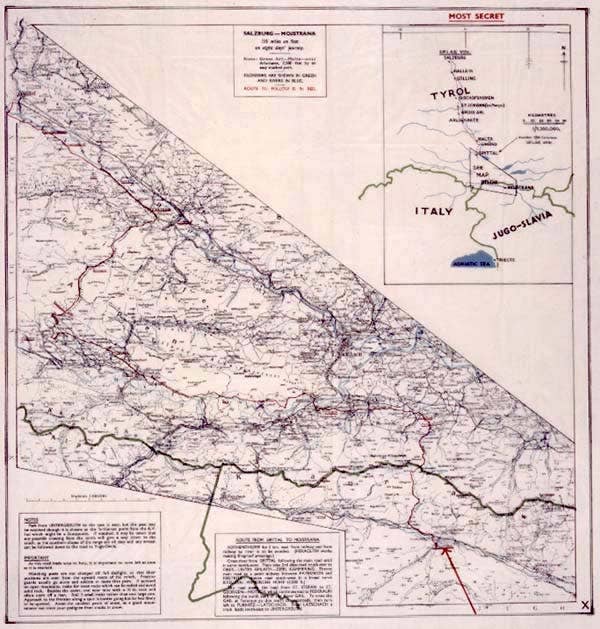
At the start of the war, Waddingtons' great rival in the UK was a playing card company called De La Rue, based in London. "I worked for Parker Bros for many years and our chief competitor was Milton Bradley," says Orbanes. "Our entire mindset was always based on: how can we beat these guys? Transfer that to England pre-war, and you've got Waddingtons in playing cards and De La Rue in playing cards and furthermore De La Rue has very significant connections to government. Waddingtons feels like De La Rue is the devil."
The real devil was waiting in the wings, however. In December 1940, the main De La Rue factory at Bunhill Row was hit by a bomb during the first big fire raid of London -- a significant score for the Nazis had they actually realised what they'd done, since, alongside printing Churchill's favourite make of playing card, De La Rue was also churning out banknotes for the Royal Mint. "After this raid, the managing director of Waddingtons, which would have been Victor's father, gets together with the head of De La Rue, and Waddingtons pledges that they will be supplying playing cards for De la Rue to keep their business up," explains Orbanes. "And as time goes on and De La Rue needs to get back into the business of printing banknotes, so Waddingtons, in the interests of the country and the war actually employs the head of De La Rue to run the printing of the banknotes in their facilities in Leeds. All despite their rivalry."
Waddingtons had leapt in to save the day and was now on MI9's radar as a result. On top of that, the firm was also the UK's leading expert at printing on silk, which was primarily used for playbills. Clayton Hutton was quick to act.
Before the end of 1940, MI9 made contact, sending a Ministry of Supply man named Edward Alston up to Leeds to quietly check if Waddingtons had the right character to help with the war effort. Once satisfied, Alston returned to read the firm the official secrets act and explain the escape maps plan. In the years that followed, Waddingtons began turning out silk maps for Clayton Hutton and his various kits. By the middle of the war, MI9 was receiving hundreds of these maps from a handful of suppliers; many of them ended up sewn into the flight suits of airmen before they set off on missions.
Waddingtons was also asked to lend a hand in related areas, too. Beyond the fact that it didn't rustle and it didn't crease, silk had another quality that made it an ideal escape aid: if you set fire to it, the whole thing went up in a bright puff and left nothing for the enemy to discover. MI9 was soon commissioning other combustible maps, including sets printed on playing cards that had been specially manufactured using volatile gun cotton. These would have been a nightmare to produce even without the Blitz, and they required an on-site fireman whenever they were coming off the presses. It was worth the pain: one prod of a cigarette ember and the card in question would actually explode. Sometimes working closely with Maskelyne, wherever Clayton Hutton and his roving imagination went, a magician's touch was always present.
"Ask and it shall be given you; seek and ye shall find..."
All of this was useful for people on active duty should they find themselves down behind enemy lines, but what about the tens of thousands of soldiers, men like my grandfather, who had already been captured? "My aim, right from the start of my association with the escape department had always been to discover a foolproof system for introducing my 'toys' into the camps themselves," Clayton Hutton writes in Official Secret. "To arrange for the odd map and compass to be smuggled to particular prisoners was one thing; to initiate and maintain a steady flow of all our devices was another."
Tricky stuff, and complicating matters further was the fact that Clayton Hutton was adamant he didn't want to meddle with two legitimate sources of access to POWs -- Red Cross parcels containing food and clothing, and the monthly care packages prisoners were entitled to receive from their families. "I could not afford to ignore the provisions of the Geneva Convention," he writes, "and I felt it would have been unfair to have taken advantage of what was, after all, merely a concession."
Luckily, the Germans could not afford to ignore the Geneva Convention either, not least because, as Orbanes tells me, if they were able to meet the nutritional and humanitarian requirements set for POWs, they would be allowed to take part in transfer programmes. They could effectively trade prisoners with the allies in exchange for their own prisoners -- or, more likely, for medicine, food, and other supplies. MI9 might have been the first organisation to think of POWs as assets, then, but they had always been plain old resources -- part of a vast wartime economy that operated between even the most bitter of enemies.
Clayton Hutton's eventual solution capitalized on all of this beautifully. With the maps and escape gadgets stockpiling in the UK, MI9 set to work creating dozens of fictitious charities to mingle with the flood of entirely legitimate local associations, church groups, sports firms and stores who were already sending regular packages to POWs in camps across Europe -- packages that the Germans were as eager to receive as the prisoners themselves, since it made their care duties considerably lighter.
Addresses were selected from lists of bombed-out buildings, and printers were engaged to put together letterheads for these fake groups, many of which "were littered with quotations that would act both as clues and as an inspiration to the prisoners," as Clayton Hutton puts it. Some of these clues were pretty daring, such as a few lines from St Matthew, Chapter 7: "Ask and it shall be given you; seek and ye shall find; knock and it shall be opened unto you." I am reminded, whenever I read this, of the story of the US prison escape attempt that was foiled only because the chef baking the cake with the file in it got a little carried away and wrote, "Good luck with the break-out!" in icing. In truth, though, MI9's boldness is yet more proof of how unprecedented its mission was. Germany was unprepared for this kind of thinking because nobody had thought this way before -- not this systematically, at least.
In his autobiography, Clayton Hutton refers to this ongoing mission as Operation Post-Box, and it was a truly vast undertaking. Once the charities and church organisations were set up and the supply lines tested, MI9 was soon sending a veritable flood of escape tools into POW camps around Europe. Local currency was sealed in gramophone records and the covers of hardback books, maps were hidden in playing cards. Pens and pencils were hollowed out, and POWs would be able to find anything from dyes and compasses to fold-out saws if they knew where to look for them. MI9 didn't overlook board games, either -- and one board game in particular.
Free parking
Somewhere around 1943, Monopoly entered the Second World War in style. It had to be in style, really: there was no other workable choice. "The standard set at the time would have been a game board with a separate box for utensils," explains Orbanes, "which was how games were sold for decades to save space and cost." While such an approach was good for the bottom line, it was pretty much useless for MI9 and its escapologists, who needed boxes of a decent size to conceal their trickery. This is why the fancier -- and more expensive -- Deluxe edition was probably employed.
"The Deluxe set looks very much like the set you would have found in stores maybe ten years ago," Orbanes tells me. "The box would have been the same size as the game board. The board fit into the box, and the box was maybe an inch in depth. It was black in colour and it had a two-colour label that adhered to the middle of the top surface. That's what would have been shipped into the German POW camps."
And what would have been inside it? "There's an organization here in the US called the Army Air Force Historical Association," Orbanes says. "They made contact with me about three years ago after looking at my book on Monopoly, and one of their members, a graphic artist, took it upon himself not only to do a lot of research through whatever his channels would be, but also to recreate one of these sets, which he's done for display at their headquarters.
"What he found out along the way is that the tools that most likely would have been used in this set would have been a very small compass, maybe an inch in diameter, and they also would have had files -- two different types to get you through fencing material, and probably a folding pair of shears, a very small set of shears that would collapse on a pivot, and then of course a silk escape map that would have been appropriate for whatever camp the delivery was for." Skilled technicians at Waddingtons would have cut precise openings for the tools in the cardboard liner of the game boards, while foreign currency money pads would have been assembled with a few Monopoly bills on top for disguise. Orbanes also says that one of six possible area maps would have been added to each game, and printing marks -- a seemingly errant period after a specific location on the board itself that would pass as a production gaff -- would have disclosed the kind of map that was inside. A period placed after Mayfair would signal a map of Scandinavia and upper Germany, say, while one after Free Parking referred to Northern France.
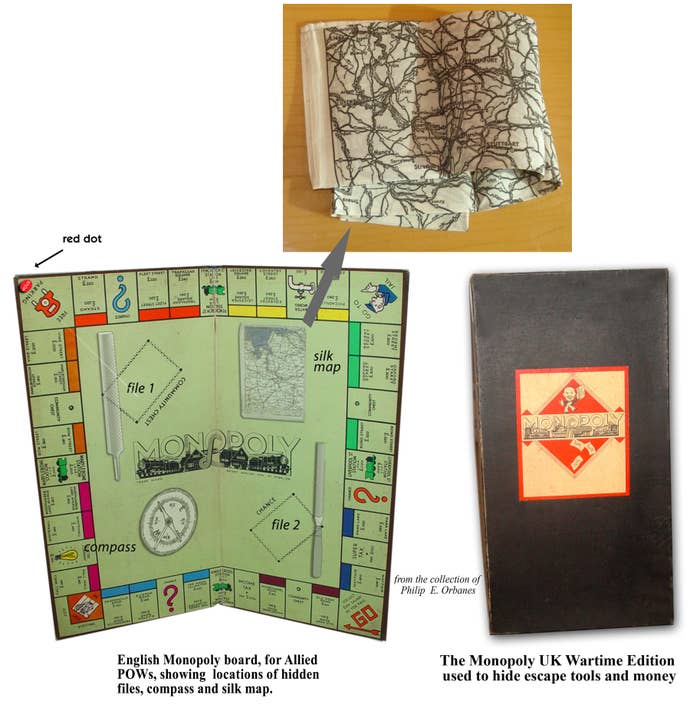
There is a fair degree of mystery to the exact details even today, and that's because the paper trail is hard to follow -- and made harder by the official secrets act. Writing while many of the crucial details were classified, Clayton Hutton makes no mention of Monopoly in his autobiography, for example, although he talks at length about tricked-out chess sets and Snakes and Ladders boards. Meanwhile, any production orders or correspondence between Waddingtons and MI9 relied heavily on codes that had been agreed in advance. "The whole business of making the maps was shrouded in secrecy and the [production] letters do not tell the whole story," writes Bodleian map expert Debbie Hall in an article on the subject. "Many communications were by word of mouth and never written down for security reasons... The very first letter from the correspondence seems to be the only one even to mention the word 'maps'. One letter, from Clayton-Hutton of M19 to Norman Watson of Waddington, states cryptically that, 'I have some ideas on the lines you and I know of,' but gives no indication of what these lines are."
Did the Monopoly gambit work? According to Orbanes it worked perfectly -- in part because German soldiers steered well clear of care packages since they didn't want to jeopardize their prisoner exchange agreements, and partly because, well, who doesn't like Monopoly anyway? "The German guards knew that if the prisoners were diverted by some pastime, like playing Monopoly, they would be less inclined to spend their time thinking about how to escape," laughs Orbanes. "The Germans were actually glad when games and pastimes came into the camps because it meant that more of the prisoners could be engaged in calming activities."
End-game
I've played a lot of Monopoly over the years, and if there's one thing I'm certain of it's that the worst part of any game comes once victory is obvious. If you're on the losing side, you know you're eventually going to be crushed and that the best you can hope for is a quick death. If you're winning, you often discover that there's something peculiarly hollow about the achievement. The fun of the whole enterprise dissipates swiftly as players are eliminated and the social heat that Monopoly relies upon to work its various spells begins to cool.
Similarly I suspect that, welcome as it was, the end of the war took a toll on Clayton Hutton. He was a schemer and a plotter by nature, and these sorts of people often require an antagonist. His energy needed some kind of focus, and as Germany crumbled, that focus was weakening.
"Christopher Clayton Hutton was clearly a very clever and original thinker," Hall tells me over email, "and he obviously prided himself on being a bit of a maverick. He was also highly-strung; he went on to have a nervous breakdown brought on by overwork." In this light, the last section of Official Secret is heartbreaking. The man in a hurry suddenly has nothing left to keep him busy, so he becomes fixated with trying to tell his story. The final pages of the book see him butting heads with the establishment for a last time: he's desperate to be able to talk about his various inventions and to explain his ingenuity to the world with books and with lecture tours, but he can't. The best stuff's all still classified -- the deal is compromised.
It's Houdini and the packing crate all over again. MI9 was closed in 1945 following the cessation of hostilities, and its very best stories would not emerge for some time. Clayton Hutton died in 1965, much of his finest work unrecognised, most of his victories hard to quantify.
This is one of the most interesting questions hanging over the whole affair, in fact. Once Monopoly -- and the other escape aids -- were in the camps, how successful were they as agents of MI9? Is it possible that there were people who were in POW custody in Europe who actually made it back to the UK because of those Deluxe sets in their posh black boxes?
"I've asked that question more than once to Victor," says Orbanes. "And his researchers, the ones that have been supplying him with information, suggest that 35,000 prisoners made it back over the entire course of the war. What did they have? You needed tools, you needed currency. Bribing was fairly commonplace. If you're a prisoner in France and you know that all you need to do is get to the underground and they'll get you out? The fact of the matter is that Monopoly was a primary means of getting prisoners what they needed to get out."
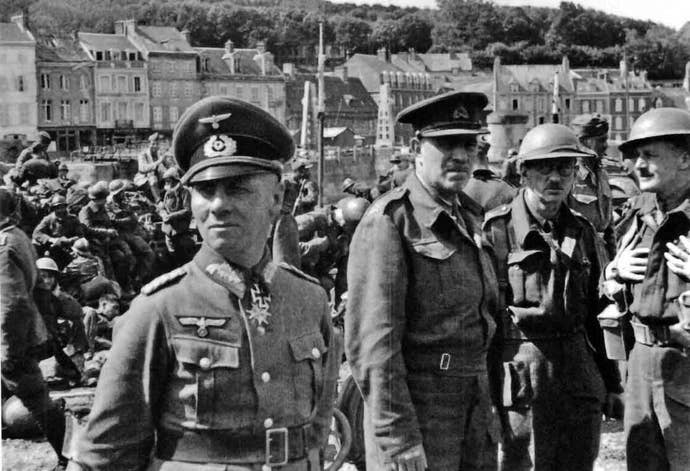
"It's impossible to know how many of the maps smuggled into the camps were found or used," writes Hall, who again cites the figure of 35,000 escapees over the course of the war. "It has been estimated that about half of these would have had a silk map with them. In many of these cases their maps and compasses, and other escape aids, must have saved their lives." In an email to me, she adds, "I do wonder how useful the maps were because they are [mostly] so small scale. But presumably any map is better than none."
Many of the silk maps made it back at any rate -- both the British Library and the Bodleian have collections, and they sometimes turn up at auction or on sites like eBay. Other escape paraphernalia has also been recovered over the decades: fragments of a brilliant, and peculiarly British, sort of adventure. As for Monopoly, though? That's a different story. As far as I've been able to tell, no genuine escape sets from the war years have yet been unearthed. Not one.
"That's true," says Orbanes when I mention this. "And it is such a shame. In the Imperial War Museum, you can see the display of escape materials. You can see silk maps, you can see playing cards. But you will not see a Monopoly game."
"It was small quantities..."
Monopoly's use in World War 2 is now relatively well-known. Every few months the story is retold in a newspaper article or on the radio, and while the facts sometimes shift around in the telling, the main thrust of the narrative remains constant: canny old England, good old Monopoly, gissa boost over the wires, Sarge?
Some researchers have cast doubt on the heroic tale, though -- and they have some interesting arguments. While a little of the surrounding debate has hinged on straightforward confusions -- it's often been mistakenly reported that the kits got into the camps with Red Cross packages, for example, which would have posed an inconceivable risk to POWs' well-being if detected -- the absence of any surviving boards and sets certainly seems enduringly difficult to explain.
"I have yet to find just one game/board, so if you come across such a board, do please let me know," says Harold Lee, a UK-based Monopoly researcher and expert on sets produced prior to 1952, who remains understandably puzzled by the lack of material evidence to back up the narrative. "If these special edition wartime games exist, they will eventually surface. Probably will be outside my range, but still will be rather exciting to see one. If none shows up in the next five years, then I will question if any were ever made. I will then just have to say this 'story' remains fascinating and that's all it is, no more."
A large part of the answer regarding the missing boards may lie with the production numbers. "It's not as if they made hundreds of these sets and locked them in a vault and then used them as required," says Orbanes. "No, they made each set custom. It wouldn't help to have an escape map for your grandfather for France, right? He was in Poland. It was very important, as Victor pointed out to me, that they would put the right set with the right map and the right currency to go each camp specifically. That's a very important point to make.
"There were not thousands of these things," he continues. "There may have been hundreds. And what has survived is some documents that Alston wrote that specifically gave Waddingtons instructions on what to make: six for a camp near the Swiss border, say, eight for a camp in Northern Germany, five for central France. It was small quantities at a time, and these games were also co-mingled with regular boards, regular games, regular Monopoly. Remember, when the first articles about this were published in the 1980s, these were by men who had no axe to grind. They were just free to tell their stories and they did it in such vivid detail."
"I can't say for sure that the Monopoly boards were sent out, but Waddington were clearly both printing silk maps and making boards for this purpose," agrees Hall. "The letters between Clayton Hutton and Waddington certainly imply that this was the intention. It is just possible that Waddington was commissioned to do this and then the boards were never used for some reason, but I've no reason to think that this was the case."
XXB
Whether the Monopoly escape kits ever made it out of Waddingtons probably shouldn't matter. Clayton Hutton and MI9 did more than enough throughout the course of the war to offer aids to prisoners who wanted to escape, and there are plenty of examples of other games that definitely were pressed into service. Weaponized Snakes and Ladders! That's still a pretty good story, all told.
It's Monopoly that makes it a great story, though. It's Monopoly that transforms this plucky narrative into something that's truly memorable. It's Monopoly that all those news stories and radio documentaries tend to fixate upon too, because, unlike Ludo or Snakes and Ladders, it's iconic and intrinsically part of the texture of the 20th century. It's a game with an opinion about the world that created it and, if it went to war, it took our philosophies along too.
And I would love to say that, if you were a POW in the Second World War, even if your particular board didn't contain a map or real currency or a handy compass, on some level Monopoly was a potential life-saver anyway. A potential life-improver at least. Yet I often think of my grandfather in that Polish prison, and I wonder about him. I wonder about what the war did to him even safe, as he was, from the sharp end of conflict. In my memory, he was a gentle presence, full of parlor games and bad James Cagney impressions -- a man who loved stamp collecting and the piano accordion. What could such a mild character do to cope in prison, and how did he handle the sheer panoramic enormousness of the war taking place around him? Stanley Solly, who had never left Kent before and was in love with the rather stern girl who worked at the local department store. Stanley Solly, who was suddenly under lock and key in a foreign country, surrounded by armed guards and strange weaponry.
A few months back, all I really knew about the POWs like my grandfather were those chummy group photographs they constantly seemed to be posing for and The Great Escape, a movie that spends its first act making Stalag Luft III seem like a sort of rustic holiday destination -- a Center Parcs with staff uniforms designed by Hugo Boss. What I was missing, I think, was a sense of the awful vacuum that war creates within it -- the terrifying absence of any kind of wider context prisoners might need, that leaves them unaware of even the size of the camp they're actually interred in, let alone what's going on elsewhere.
Even today, I still don't know many of the details of my grandfather's wartime experience. He inevitably sanitized any anecdotes he told his grandchildren, and the memoir he left behind when he died in 1986 was sufficiently traumatic that my grandmother promptly burned it. I do have one dark story he used to tell my mother, though. He told her that the prisoners would dread the arrival of the post from home because of the Dear John letters it would often bring. My grandfather and his friends used to quietly fret whenever the mail arrived, looking around the makeshift breakfast table and wondering who would try and hang themselves in the toilets later on that day. Was this what he was really thinking of when he told me about memorable moments, when he told me of Old Kent Road and Whitechapel?
So what could his life have been like out there? From The Last Escape, there's the story, by no means exceptional, of Private Les Allan, who was captured in Dunkirk in May 1940 and also ended up at XXB. His narrative has a kind of sustained and even-tempoed awfulness to it. His first job on site entails sawing ice blocks from a frozen river in the middle of a bitter Polish winter. One day, he's beaten senseless by a guard for no obvious reason, his jaw broken by a rifle butt. He works for four and a half years in wretched conditions -- on roadworks, on farms, and at sugar-beet factories. Finally, a forced march west at the end of the war sees him eating pigeons and dogs to stay alive. "A dog's skin made excellent gloves or covers for your feet," he explains. "It was a primeval existence, back to the caveman."
To be a POW was to be held captive by men who probably felt equally powerless, equally frustrated, equally terrified. Both prisoner and guard were often equally alarmed by the Soviet soldiers that eventually came to liberate the camps, too, while the war's conclusion was actually worse than most of what had come before. It meant more marching, more starving, yet more uncertainty, as prisoners of all nations picked their paths through a surreal bombed-out world -- a Europe that had been totally transformed while they were locked away.
Monopoly couldn't protect you from any of that, even if you did adapt the rules so it took a fortnight to play. Nothing could protect you from that, I guess, except for stubbornness, luck, and an inevitable hardening of the heart. And yet Monopoly must have helped in its own quiet way, and in its own quiet moments? If you were scared, dispirited, tired and bored, Monopoly might have become more than a game played with cards, a spinner and a bunch of counters. It might have become an exporting of place and of ideas: a pasteboard portal to a comforting and recognisable and fundamentally undamaged world where stupid things like money and property and winning second prize in a beauty contest (collect £10) really mattered again.
The true nature of an escape can be surprising. That's the second, deeper lesson that Houdini taught Clayton Hutton, I think. This board, these pieces, may not always contain maps and compasses and local currency, but they can still pluck you from your miserable huts and cells and castles and take you back to a land of wealth, of bright cities and big plans. They will provide you will the illusion, at least, of agency. Maybe sometimes the illusion is enough.
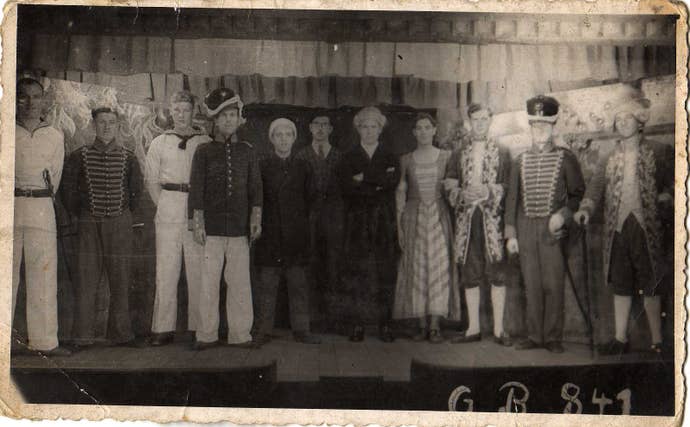
And, with its ability to transport -- its ability to create not just a game but an actual ideology that unfolds and captivates as you play -- the Monopoly story gets one last kink in the tale. There's another potential reason why no sets were recovered after the war, and it's fascinating.
"When the war ended," explains Orbanes, "whatever sets were still at Waddingtons, the company was told immediately: destroy them. 'And if you have any records whatsoever pertaining to this, destroy them as well.'"
Why? Orbanes laughs. "I find this to be wonderful. The reason why the materials were destroyed and the secret was kept for so long was because, if the Cold War had flared up and there was actually fighting again on the continent and POWs were a problem once more, they wanted to be able to reuse this Monopoly technique again. Because there was no rumor or hint or scuttlebutt that this stuff was going on, the secret was preserved. And they kept it preserved until they knew it would no longer be applicable."
That's an idea that even Clayton Hutton would admire, I suspect. The long con -- four decades long -- delivered with a tart thematic twist. In the central ideological war of the late 20th century, a key role was to be played by a game that doesn't merely toy with capitalism, but actually shows it in action.
